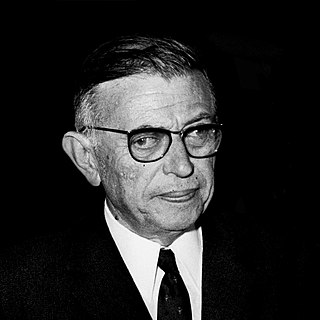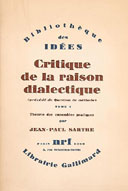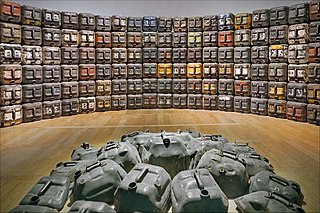Related Research Articles

Colonialism is the advancement of control over and exploitation of land and people by separation, through another and often foreign group. Colonizers monopolize political power and hold conquered societies and their people to be inferior to their conquerors in legal, administrative, social, cultural, or biological terms. While frequently advanced as an imperialist regime, colonialism can also take the form of settler colonialism, whereby colonial settlers invade and occupy territory to permanently replace an existing society with that of the colonizers, possibly towards a genocide of native populations.

Jean-Paul Charles Aymard Sartre was a French philosopher, playwright, novelist, screenwriter, political activist, biographer, and literary critic, considered a leading figure in 20th-century French philosophy and Marxism. Sartre was one of the key figures in the philosophy of existentialism. His work has influenced sociology, critical theory, post-colonial theory, and literary studies. He was awarded the 1964 Nobel Prize in Literature despite attempting to refuse it, saying that he always declined official honors and that "a writer should not allow himself to be turned into an institution."

Frantz Omar Fanon was a French Afro-Caribbean psychiatrist, political philosopher, and Marxist from the French colony of Martinique. His works have become influential in the fields of post-colonial studies, critical theory, and Marxism. As well as being an intellectual, Fanon was a political radical, Pan-Africanist, and Marxist humanist concerned with the psychopathology of colonization and the human, social, and cultural consequences of decolonization.
Neocolonialism is the control by a state over another nominally independent state through indirect means. The term neocolonialism was first used after World War II to refer to the continuing dependence of former colonies on foreign countries, but its meaning soon broadened to apply, more generally, to places where the power of developed countries was used to produce a colonial-like exploitation.

Critique of Dialectical Reason is a 1960 book by the philosopher Jean-Paul Sartre, in which the author further develops the existentialist Marxism he first expounded in his essay Search for a Method (1957). Critique of Dialectical Reason and Search for a Method were written as a common manuscript, with Sartre intending the former to logically precede the latter. Critique of Dialectical Reason was Sartre's second large-scale philosophical treatise, Being and Nothingness (1943) having been the first. The book has been seen by some as an abandonment of Sartre's original existentialism, while others have seen it as a continuation and elaboration of his earlier work. It was translated into English by Alan Sheridan-Smith.

Aimé Fernand David Césaire was a Martiniquais poet, author, and politician. He was "one of the founders of the Négritude movement in Francophone literature" and coined the word négritude in French. He founded the Parti progressiste martiniquais in 1958, and served in the French National Assembly from 1945 to 1993 and as President of the Regional Council of Martinique from 1983 to 1988. He was also the Mayor of Fort-de-France for 56 years, from 1945–2001.

The Wretched of the Earth is a 1961 book by the philosopher Frantz Fanon, in which the author provides a psychoanalysis of the dehumanizing effects of colonization upon the individual and the nation, and discusses the broader social, cultural, and political implications of establishing a social movement for the decolonisation of a person and of a people. The French-language title derives from the opening lyrics of "The Internationale", which is reflected in the English title as well.
A colonial mentality is the internalized attitude of ethnic or cultural inferiority felt by people as a result of colonization, i.e. them being colonized by another group. It corresponds with the belief that the cultural values of the colonizer are inherently superior to one's own. The term has been used by postcolonial scholars to discuss the transgenerational effects of colonialism present in former colonies following decolonization. It is commonly used as an operational concept for framing ideological domination in historical colonial experiences. In psychology, colonial mentality has been used to explain instances of collective depression, anxiety, and other widespread mental health issues in populations that have experienced colonization.
Négritude is a framework of critique and literary theory, mainly developed by francophone intellectuals, writers, and politicians in the African diaspora during the 1930s, aimed at raising and cultivating "black consciousness" across Africa and its diaspora. Négritude gathers writers such as sisters Paulette and Jeanne Nardal, Martinican poet Aimé Césaire, Abdoulaye Sadji, Léopold Sédar Senghor, and Léon Damas of French Guiana. Négritude intellectuals disavowed colonialism, racism and Eurocentrism. They promoted African culture within a framework of persistent Franco-African ties. The intellectuals employed Marxist political philosophy, in the black radical tradition. The writers drew heavily on a surrealist literary style, and some say they were also influenced somewhat by the Surrealist stylistics, and in their work often explored the experience of diasporic being, asserting one's self and identity, and ideas of home, home-going and belonging.
Internal colonialism is the uneven effects of economic development on a regional basis, otherwise known as "uneven development" as a result of the exploitation of minority groups within a wider society which leads to political and economic inequalities between regions within a state. This is held to be similar to the relationship between a metropole and a colony, in colonialism proper. The phenomenon leads to the distinct separation of the dominant core from the periphery in an empire.
In existentialism, bad faith is the psychological phenomenon whereby individuals act inauthentically, by yielding to the external pressures of society to adopt false values and disown their innate freedom as sentient human beings. Bad faith also derives from the related concepts of self-deception and ressentiment.
The Jeanson network was a group of French leftwing militants led by Francis Jeanson who helped Algerian National Liberation Front agents operating in the French metropolitan territory during the Algerian War. They were mainly involved in carrying money and papers for the Algerians and were sometimes called "the suitcase carriers", a notion from the French resistance movement during World War II. The communist anticolonialist activist Henri Curiel participated in the network, as did the forger Adolfo Kaminsky. The philosopher Jean-Paul Sartre and writer Simone de Beauvoir were supportive of the Jeanson network. Photojournalist and author Dominique Darbois was another intellectual in Jeanson's network.

Western European colonialism and colonization was the Western European policy or practice of acquiring full or partial political control over other societies and territories, founding a colony, occupying it with settlers, and exploiting it economically. For example, colonial policies, such as the type of rule implemented, the nature of investments, and identity of the colonizers, are cited as impacting postcolonial states. Examination of the state-building process, economic development, and cultural norms and mores shows the direct and indirect consequences of colonialism on the postcolonial states. It has been estimated that Britain and France traced almost 50% of the entire length of today's international boundaries as a result of British and French imperialism.
Abdelkader Guerroudj was an Algerian man who was condemned to death in December 1957 along with his French wife, Jacqueline Guerroudj. They were convicted as accomplices of Fernand Iveton, the only European who was guillotined for his part in the Algerian revolt. As a result of a high-profile campaign in France, where the issue was called L'Affaire Guerroudj, neither was executed.
Postcolonialism is the critical academic study of the cultural, political and economic consequences of colonialism and imperialism, focusing on the impact of human control and exploitation of colonized people and their lands. The field started to emerge in the 1960s, as scholars from previously colonized countries began publishing on the lingering effects of colonialism, developing a critical theory analysis of the history, culture, literature, and discourse of imperial power.

Postcolonial international relations is a branch of scholarship that approaches the study of international relations (IR) using the critical lens of postcolonialism. This critique of IR theory suggests that mainstream IR scholarship does not adequately address the impacts of colonialism and imperialism on current day world politics. Despite using the language of post-, scholars of postcolonial IR argue that the legacies of colonialism are ongoing, and that critiquing international relations with this lens allows scholars to contextualize global events. By bridging postcolonialism and international relations, scholars point to the process of globalization as a crucial point in both fields, due to the increases in global interactions and integration. Postcolonial IR focuses on the re-narrativization of global politics to create a balanced transnational understanding of colonial histories, and attempts to tie non-Western sources of thought into political praxis.
Madah-Sartre is a seven-act play by Alek Baylee Toumi, first published in French in 1996 and published in English in 2007. It depicts a fictional abduction by Islamists of Jean-Paul Sartre and Simone de Beauvoir in Algeria in 1993, and attempts by these Islamists to convert their captives to Islam.
Situation is a concept developed by French philosopher Jean-Paul Sartre. It refers to "how ritualized action might be avoided or at least confronted consciously as contrary to the subject's freedom of nihilation". It was first expressed in his 1943 work Being and Nothingness, where he wrote that:
[T]here is freedom only in a situation, and there is a situation only through freedom [...] There can be a free for-itself only as engaged in a resisting world. Outside of this engagement the notions of freedom, of determination, of necessity lose all meaning.

Imperialism, the Highest Stage of Capitalism, originally published as Imperialism, the Newest Stage of Capitalism, is a book written by Vladimir Lenin in 1916 and published in 1917. It describes the formation of oligopoly, by the interlacing of bank and industrial capital, in order to create a financial oligarchy, and explains the function of financial capital in generating profits from the exploitation colonialism inherent to imperialism, as the final stage of capitalism. The essay synthesises Lenin's developments of Karl Marx's theories of political economy in Das Kapital (1867).

Decoloniality is a school of thought that aims to delink from Eurocentric knowledge hierarchies and ways of being in the world in order to enable other forms of existence on Earth. It critiques the perceived universality of Western knowledge and the superiority of Western culture, including the systems and institutions that reinforce these perceptions. Decolonial perspectives understand colonialism as the basis for the everyday function of capitalist modernity and imperialism.
References
- Jean-Paul Sartre. 'Colonialism and Neocolonialism, translated by Steve Brewer, Azzedine Haddour, Terry McWilliams; republished in 2001 by Routledge France. ISBN 0-415-19145-9.